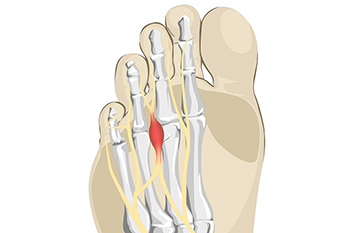 Many runners develop a condition known as Morton’s neuroma which is a thickening of a nerve in the foot. It usually affects the large nerve between the third and fourth toe, which is more susceptible to pressure, irritation and injury, and results in painful inflammation. Runners and people playing sports that involve pressure on the ball of the foot are more apt to develop this condition. Also, women wearing high heels, with a lack of room in the toe box and improper cushioning are susceptible. People with flat feet, high arches, bunions or hammertoes are also at risk. Morton’s neuroma is thought to be a progressive ailment, and for that reason diagnosis is often delayed until the condition becomes more severe. At some point, the symptoms become more painful and frequent and last longer. Many people complain of having a pebble in their shoe or feel like their sock is bunched up. It is suggested that you consult with a podiatrist at the earliest onset of such symptoms for a diagnosis and treatment plan.
Many runners develop a condition known as Morton’s neuroma which is a thickening of a nerve in the foot. It usually affects the large nerve between the third and fourth toe, which is more susceptible to pressure, irritation and injury, and results in painful inflammation. Runners and people playing sports that involve pressure on the ball of the foot are more apt to develop this condition. Also, women wearing high heels, with a lack of room in the toe box and improper cushioning are susceptible. People with flat feet, high arches, bunions or hammertoes are also at risk. Morton’s neuroma is thought to be a progressive ailment, and for that reason diagnosis is often delayed until the condition becomes more severe. At some point, the symptoms become more painful and frequent and last longer. Many people complain of having a pebble in their shoe or feel like their sock is bunched up. It is suggested that you consult with a podiatrist at the earliest onset of such symptoms for a diagnosis and treatment plan.
Morton’s neuroma is a very uncomfortable condition to live with. If you think you have Morton’s neuroma, contact Warren Levy, DPM of Armitage Podiatry Center. Our doctor will attend to all of your foot care needs and answer any of your related questions.
Morton’s Neuroma
Morton's neuroma is a painful foot condition that commonly affects the areas between the second and third or third and fourth toe, although other areas of the foot are also susceptible. Morton’s neuroma is caused by an inflamed nerve in the foot that is being squeezed and aggravated by surrounding bones.
What Increases the Chances of Having Morton’s Neuroma?
- Ill-fitting high heels or shoes that add pressure to the toe or foot
- Jogging, running or any sport that involves constant impact to the foot
- Flat feet, bunions, and any other foot deformities
Morton’s neuroma is a very treatable condition. Orthotics and shoe inserts can often be used to alleviate the pain on the forefront of the feet. In more severe cases, corticosteroids can also be prescribed. In order to figure out the best treatment for your neuroma, it’s recommended to seek the care of a podiatrist who can diagnose your condition and provide different treatment options.
If you have any questions, please feel free to contact our office located in Chicago, IL . We offer the newest diagnostic and treatment technologies for all your foot care needs.
